ANDREA CHENIER
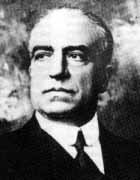

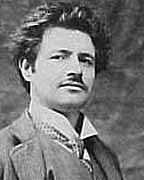
UMBERTO GIORDANO
The composer of
Andrea Chenier
JOSE CARRERAS
Andrea Chenier was
one of his signature roles
GIUSEPPE BORGATTI
Created the role of
Andrea Chenier in 1896
THE REAL ANDRÉ CHÉNIER
Biography by Mario Hamlet-Metz
André Chénier, born in Constantinople on October 30, 1762, was the third son of Louis de Chénier, an officer at the French embassy; his mother was a Greek, Santi l'Homaka ("la belle Grecque"), famous for her beauty and wit. After spending most of his childhood in southern France with an aunt, André joined his mother in Paris, where she had settled in 1773. While still in his teens, he became a fervent admirer of everything related to the language and civilization of ancient Greece. His natural fever for knowledge was stimulated even more by the brilliant artists and intellectuals he met during his mother's weekly soirées.
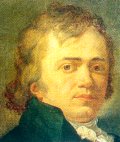
His Levantine background and the luxury and refinement in which he was brought up made Chénier an attractive bon viveur who thoroughly enjoyed the easy nonchalance reigning in the Parisian salons - and boudoirs. At the same time there was in him the sensitive artist gifted with a rich inner life, one that allowed him to isolate himself from the troubled world around him and to take wing into the spheres of meditation and poetic inspiration. The only true poet of his time, he rediscovered Greek classic literature and gave it renewed beauty in his own powerful verses, conciliating antiquity and modern thought most naturally and restoring long-lost lyricism to French poetry.
Predictably, Chénier detested garrison life in Strasbourg, where the regiment he joined in 1782 as a gentleman-cadet was stationed, and after six months he was back in Paris writing feverishly for a couple of years, until he realized his was no time for poetry. He became a member of the Society of '89 (the moderate wing of the revolutionary party) and subsequently started his short career as a political journalist, fighting eloquently against anarchy, injustice and tyranny. After the imprisonment of Louis XVI he sensed that the defense of the principles of the Revolution within the framework of moderation, law and order was a utopian dram and, in bitter disillusionment, decided to withdraw from public life. He fled Paris for some time, but too fascinated by political events, he couldn't refrain from returning - a fatal decision.
On March 4, 1794, he was arrested by mistake while visiting friends in Passy and taken to police headquarters at the Luxembourg; officials didn't want to keep him, for there was no arrest warrant, but all the same sent him on to St. Lazare Prison, where he spent the last four and a half months of his life.
Originally a leper hospital, St. Lazare had become a prestigious correctional institution for "prodigal sons" as early as 1632. During the Revolution it became a political prison and was called "one of the guillotine's most plentiful pantries". There Chénier met, among others, the poet Jean-Antoine Roucher, who became his confidant; Louise de Laval-Montmorency, abbess of Montmartre (both mentioned in the opera Andrea Chénier); a Vergennes (possibly the son of the Count Gravier mentioned in Act III of the opera, who had died in 1787); J.B. Suvée, who painted his most famous portrait, and Aimée de Coigny, Duchess of Fleury, alias Citizeness Franquetot.
Chénier was at once attracted by this charming 23-year-old beauty, who became, after the already immortalized Lycoris and Fanny, his last muse, the one who inspired his best verses, those of "The Young Captive". This poem - which, along with all the others he wrote at St. Lazare, was concealed in a basket of soiled linen and sent beyond the prison walls to posterity - contributed immensely to the legend of Chénier and Aimée's tragic love affair, which, of course, never did occur in real life. In fact, this muse was hardly the angelic creature she appears to be in the poem, which actually may have been nothing more than an aesthetic reverie. Married at 16, Aimée had taken in the years that followed such famous lovers as the irresistible "beau" Lauzun, Lord Malmesbury and M. de Montrond. The last mentioned was imprisoned at St. Lazare with her and married her (Aimée's husband had died in exile) after they were set free - via a 100-louis bribe to the prison guard. In her memoirs there is no metnion of Chénier, and it is very likely that she didn't even know she had been immortalized in verse.
On July 24, 1794, Chénier was taken before the Revolutionary Tribunal, where he was accused of writing against freedom in favor of tyranny (!), of participating in the scandalous conspiracy of prisons (a machination of the sinister public prosecutor Fouquier-Tinville) and of being an assistant to the disgraced General Dumouriez (here he was mistaken for his brother Sauveur Chénier, who had indeed fought under Dumouriez). The jury paid little attention to the charges and was fast in passing sentence: immediate death. Chénier and 37 other prisoners were then taken to the Conciergerie, where, on the eve of his execution, he wrote these moving verses, so similar in their essence to those Illica would write in his libretto ("Come un bel dì di maggio"):
As the sun's last flashing ray,
As the last cool breeze from the shore,
Cheer the close of a dying day,
Thus I strike my lyre once more.
As now by the scaffold I wait,
Each moment of time seems the last,
For the clock, like a finger of fate,
Points onward and onward fast.
A poet until his last minute, he stepped onto the dernière charrette (also called "Sanson's cart", as in Act II of the opera) with his friend Roucher, and they both started reciting verses from Racine's Andromaque on their way to the guillotine. Chénier the political martyr was executed on July 25 on Place de la Barrière Renversée (now Place de Vincennes) and is remembered as one of the last illustrious victims of the Reign of Terror, which ended only three days later with Robespierre's own death. (The most frequently used guillotine was on Place de la Révolution - previously Place Louis XV and now Place de la Concorde - but during the last days of the Terror there were so many victims that additional scaffolds had to be built.) Chénier the poet-martyr was discovered only in 1819, when Henri de Latouche edited his complete poems. He immediately became an idol of the young Romantics, who saw in him a forerunner of their movement. His life, especially the last years, inspired numerous works, including poems by such French authors as Victor Hugo and Alfred de Musset. But the most famous of them remains, of course, Giordano's opera Andrea Chénier. BACK TO TOP
THE POETRY OF ANDRÉ CHÉNIER
How To Kill Your Best Poet: André Chénier's Iambes
By Leo Weinstein
From The Subversive Tradition in French Literature, Volume I: 1721-1870, Boston: Twayne, 1989
Regardless of the fate of his play [Charles IX; ou, l'Ecole des rois], no one denied that Marie-Joseph Chénier was a bon citoyen. An enthusiastic partisan of the Revolution, he had never wavered in its support. The same cannot be said of his older brother, André Chénier. After his education at the excellent Collège de Navarre, André eventually obtained a position as private secretary of the French ambassador to Great Britain, but when the Revolution broke out, he returned to Paris. There he threw himself into political journalism, joining his former schoolmates, the wealthy Trudaine brothers and François de Pange, in the moderate Feuillants party.
But there was no place for moderates in the French Revolution. Soon the Journal de Paris, where he had published articles, was suspended, and Chénier had to lead the life of a suspect. He went to Rouen for a while but returned to Paris, stayed in Versailles, and was arrested in Passy, where he had accompanied the Marquise de Pastoret, the wife of a man imprisoned as a traitor and conspirator. He was guillotined on 25 July 1794, at the age of thirty-one. The Revolution had killed the greatest poet France had produced in the 130 years that had passed since La Fontaine had written his fables.
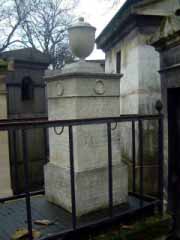
Andre Chenier's grave in
Pere Lachaise Cemetary, Paris
Chénier's fame is in great part due to his lyric and bucolic works, which revived the poetic vein in France. As a "committed" poet he holds a position midway between the seventeenth century Huguenot poet Agrippa d'Aubigné (Les Tragiques, 1616), who heaped his anger on the persecutors of the reformed faith, and Victor Hugo, whose vituperations were directed against Napoleon III. Although his production is much smaller than theirs, Chénier exhibits a great variety of tone, ranging from Olympian satire and irony to lyric and tragic outbursts.
The same variety can be found in the forms he used: the hymn, the ode, and the iambic meter. It is the latter that lends itself best to lashing out at injustice. Its originator was Archilochus, who hurled his verses at his fiancée's father, who had broken his word. In Greek poetry, the iambic meter, with its couplets of a long verse followed by a shorter one, came close to sounding like prose, but Chénier adheres more closely to classical French verse, which avoids enjambment (overflow of verse into the next line). In his Iambes, too, he introduced a new note into French poetry by preserving classical forms while at the same time diminishing none of the sting of his attacks.
Not all of Chénier's political poems are in the iambic meter. His Ode to Marie-Anne-Charlotte Corday is constructed on the theme of opposition. The revolutionaries are singing infamous hymns to Marat - Chénier will write an ode to the woman who killed Marat in his bath on 13 July 1793. For Marat he cannot find epithets insulting enough.
Le noir serpent, sorti de sa caverne impure,
A donc vu rompre enfin sous ta main ferme et sûre
le venimeux tissu de ses jours abhorrés!
Aux entrailles du tigre, à ses dents homicides,
Tu vins demander et les membres livides
Et le sang des humains qu'il avait dévorés!
(The black serpent, leaving his filthy cave,
Has finally suffered by your hand so sure and brave
The end of its venomous existence so despised!
From the tiger's guts, from his homicidal teeth
You came and drew what he'd devoured from beneath:
The blood and livid members of his victims sacrificed.)
Opposition between an ideal civilization and perverted ideals. In ancient Greece, Charlotte Corday would have been honored. "Mais la France à la hache abandonne ta tête." ("But in France your head is cut off by the ax.") Opposition, finally, between the slogan of the Revolution (Liberty, Equality, Fraternity) - which was a mockery at the time - and Truth, which remains silent, Justice, which is rendered by sinister judges, and Virtue, in the sense of moral and courageous qualities.
La vertu seule est libre. Honneur de notre histoire,
Notre immortel opprobre y vit avec ta gloire.
Seule tu fus un homme, et vengea les humains.
Et nous, eunuques vils, troupeau lâche et sans âme,
Nous savons répéter quelques plaintes de femme,
Mais le fer pèserait à nos débiles mains.
. . . . .
Un scélérat de moins rampe dans cette fange.
La Vertu t'applaudit. De sa mâle louange
Entends, bell héroïne, entends l'auguste voix.
O Vertu, le poignard, seul espoir de la terre,
Est ton arme sacrée, alors que le tonnerre
Laisse régner le crime, et te vend à ses lois.
(Virtue alone is free. Honor of our history,
Our immortal shame we live beside your glory.
Only you were a man, your knife did vengeance wreak;
And we, vile eunuchs, cowardly and soul-less cattle.
We can at best complain like women prattle,
But to wield a sword our hands would be too weak
. . . . .
In that mud crawls one scoundrel less.
Hear, lovely heroine, hear Virtue bless,
Hear the august voice of its virile praise.
Oh virtue, the dagger that hope will raise,
Is your sacred arm, when Heaven holds its thunder
And lets crime rule, while laws are cut asunder.)
Throughout the Ode to Marie-Anne-Charlotte Corday there rings a tone of bitterness and, at times, shameful resignation. By using the pronoun nous, Chénier includes himself among those who stand by, impotent and cowardly, while injustice rewards crime.
A stronger tone of accusation appears in Iambe VI, which describes the drowning of prisoners at Nantes by the infamous Carrier and his acolytes. Chénier dwells on the contrast between these atrocities and the pleasure-filled life of the barbarians who get drunk on expensive wine and satisfy their lust with cheap women. Long before Victor Hugo and the Romantic poets, André Chénier defines the role of the poet as the conscience of the people. In Iambe V, referring to the bloodthirsty tyrants, he exclaims:
Ils vivent cependant et de tant de victimes
Les cris ne montent point vers toi.
C'est un pauvre poète, ô grand Dieu des armées,
Que seul, captif, près de la mort,
Attachant à ses vers des ailes enflammées
De ton tonnerre qui s'endort,
De la vertu proscrite embrassant la défense,
Dé'nonce aux juges infernaux
Ces juges, ces jurés qui frappent l'innocence,
Hécatombe à leurs tribunaux.
Eh bien, fais-moi donc vivre, et cette horde impure
Sentira quels traits sont les miens.
Ils ne sont point cachés dans leur bassess impure;
Je le vois, j'accours, je les tiens.
(Yet they live and their victims' throttled cries
Do not rise up to your exalted heights.
It is a poor poet, oh majestic god of the armies,
Who, alone, in prison, as death he fights,
Gluing to his verses the flaming wings
Of your thunder that no longer stings,
Of virtue exiled taking the defense,
Denounces to the judges of all hells
Those judges, those juries that strike innocence,
Creating a hecatomb at their tribunals.
Just let me stay alive, and that filthy breed
Will feel the power of my pen.
They cannot hide behind their dirty deed:
I see them, I rush in, I have them.)
Chénier reveals himself as a master of irony, worthy of Voltaire, in his Hymne aux Suisses de Chateauvieux. The Swiss mercenaries in the Chateauvieux regiment had revolted in August 1790. They held their officers for ransom, looted the funds of the regiment, and engaged in combat with the National Guard. Désille, a young officer, tried to avoid bloodshed and was killed by the Swiss. The rebels were tried: twenty-three were executed and forty-one sent to forced labor on the galleys. In December 1791 the galley prisoners were granted amnesty, and in February 1792 they were set free, whereupon they marched on Paris. The Jacobins felt they could turn the Swiss rebels to political advantage and, led by Collot d'Herbois, the painter David, and Chénier's brother Marie-Joseph, they arranged for a triumphal reception of the released prisoners. On that day, 15 April 1792, André Chénier wrote his "hymn". The unsuspecting reader may be misled by the opening.
Salut, divin Triomphe! entre dans nos murailles!
Rends-nous ces guerriers illustrés
Par le sang de Désille, et par les fun7eacute;railles
De tant de Français massacrés.
Jamais rien de si grand n'embellit ton entrée,
Ni quand l'ombre de Mirabeau
S'achemina jadis vers la voûte sacrée
Où la gloire donne un tombeau,
Ni quand Voltaire mort, et sa centre bannie
Rentrèrent aux murs de Paris.
Vainqueurs du fanatisme et de la calomnie,
Posternés devant ses écrits.
(Hail, divine Triumph! enter into our walls!
Welcome back those warrious honored
For the blood shed of Désille and the funerals
Of so many Frenchmen massacred.
Never before your gates saw anything so fine.
Not even when the shade of Mirabeau
Of yore was carried to the sacred shrine.
A tomb that only glory can bestow.
Nor when Voltaire's ashes, refused a calm retreat,
To Paris came back for repose.
And fanaticism and calumny in full defeat.
Prostrate lay before his prose.)
Only the unexpected references to Désille (unknown to all but contemporaries or specialized historians) and the massacred Frenchmen (not identified in any other way) introduce a sense of ambiguity into what otherwise sounds like a traditional hymn. But soon Chénier removes all ambiguity about the real meaning of his "song of praise". he begins with another oblique slap at the sight of civic leaders who - honored by La Rapée, a restaurant where the Jacobin chiefs were suspected of indulging in orgies
De voir des échevins, que la Rapée honore,
Asseoir sur un char radieux
Ces héros, que jadis sur les bancs des galères
Assit un arrêt outrageant,
Et qui n'ont égorgé que très peu de nos frères,
Et volé que très peu d'argent.
(Place on a radiant chariot
These heroes, who previously on a galley bench
Were put by an outrageous sentence,
And who strangled but very few of our brothers
And stole but little gold from others.)
In his conclusion Chénier rises to new heights of irony. Comparing the freed galley prisoners to illustrious conquerors of the sea, he chants:
Que la Nuit de leurs noms embelisse se voiles,
Et que le nocher aux abois
Invoque en leur Galère, ornement des étoiles,
Les Suisses de Collt-d'Herbois.
(Let Night emboss their names in its veil,
And the Pilot, when he goes amiss,
Invoke in their Galley, as the stars they trail,
Collot-d'Herbois' glorious Swiss.)
The word Nuit here has a double meaning: Night and Oblivion. And the final irony of transforming the former galley slaves into superseamen invoked by lost pilots constitutes a parting shot, not so much at the Swiss rebels as at those who had turned them into heroic martyrs.
In prison, Chénier matures. He opens his heart to the sufferings of others. His most famous ode, La Jeune Captive, celebrates a young woman who actually was not so pure as he imagined and whose life was spared. The historical person matters less here than the sentiment.
In his last Iambes, the modern reader is struck by an existential note that anticipates by some 150 years Jean-Paul Sartre's mort sans sépulture. The horror of mass butchery pervades Iambe VII:
Quand au mouton bêlant la sombre boucherie
Ouvre ses cavernes de mort,
Pâtres, cheins et moutons, toute la bergerie
Ne s'informe plus son sort...
(When the somber slaughterhouse lets the bleating sheep
Into its dark and deadly gate,
Shepherds, dogs, and sheep, all of them keep
Their thoughts on any but their fate...)
And Iambe VIII:
...Quelle sera la proie
Que la hache appelle aujourd'hui?
Chacun frissonne, écoute; et chacun avec joie
Voit que ce n'est pas encor lui:
Ce sera toi demain, insensible imbécile.
(...Who will be the prey
On whom the ax will fall today?
Everybody shivers, listens, and is relieved to see
That the one called out is not yet he.
It will be you tomorrow, unfeeling fool.)
Chénier's last Iambe [IX] sums up his themes: a tenderness toward life, the defense of virtue, justice, and truth, the poet's role as witness of his times and of history, and a last shout of defiance.
Comme un dernier rayon, comme un dernier zéphyre
Animent la fin d'un beau jour,
Au pied de l'échaufaud j'essaye encor ma lyre.
Peut-être est-ce bientôt mon tour.
. . . . .
Ma vie importe à la vertu.
Car l'honnête homme enfin, victime de l'outrage,
Dans les cachots, près du cercueil,
Relève plus altier son front et son langage.
(Like a last ray of light, like a last summer breeze
Color the end of a beautiful day,
At the foot of the gallows once more my lyre I seize.
Perhaps I'll soon be on my way.
. . . . .
My life is Virtue's concern.
A decent man, whom outrage has fed,
In prison, awaiting his turn,
Lifts higher his speech and higher his head.)
Addressing Justice and Truth, he cries out:
Sauvez-moi. Conservez un bras
Qui lance votre foudre, un amant qui vous venge.
. . . . .
O ma plume! fiel, bile, horreur, Dieu de ma vie!
Par vous seuls je respire encor:
. . . . .
Nul ne resterait donc pour attendrir l'histoire
Sur tant de justes massacrés?
Pour consoler leurs fils, leurs veuves, leur mémoire,
Pour que des brigands abhorrés
Frémissent aux portraits noirs de leur ressemblance,
Pour descendre jusqu'aux enfers
Nouer le triple fouet, le fouet de la vengeance
Déjà levé sur ces pervers?
Pour cracher sur leurs noms, pour chanter leur supplice?
Allons, étouffe tes clameurs;
Souffre, ô coeur gros de haine, affamé de justice.
Toi, Vertu, pleure si je meurs.
(Save me. Preserve an arm
To hurl your thunderbolts, a lover to avenge you.
. . . . .
Oh my pen! poison, gall, horror, God of my life,
Through you alone I carry on my strife.
. . . . .
No one would remain and move history to record
About so many just people massacred?
To console their memory, their widows, their sons,
So that abhorrent highway brigands
Will tremble at their black portraits in paint?
To descend into hell, like a saint,
To tie the trifold whip, by vengeance praised,
Already on those perverts raised?
To spit on their names, to see their sentence carved?
Come now, stifle your cry;
Suffer, heart full of hate, for justice starved.
And you, Virtue, weep if I die.)
André Chénier did not write a fictional account of his sufferings nor did he sublimate them poetically. Drawn into the whirl of a mad world, he had not time to gain the necessary distance that fiction requires. And so he cast anathema at injustice, atrocity, and horror. His militant poetry does not always possess the high art that pervades his lyric poems, but his genius was such that his cries of anger, of frustration, and of vengeance created a new poetry in France, one that inspired Victor Hugo's Les Châtiments and the defiant chants of the poets of the Resistance during the Second World War.
It has been said that, in its upheavals, Spain kicked its own brains out. The French Revolution went it one better: it cut off the head of its greatest poet and left an indelible stain on a record that already had been far from clean. BACK TO TOP
THE FIRST PERFORMANCE OF ANDREA CHENIER
Umberto Giordano's Andrea Chenier premiered at La Scala on 28 March 1896. Giordano and his librettist Luigi Illica had all but given up hope of seeing their new opera come to the stage after unfavourable comments about it caused the original tenor, Garulli, to pull out of the leading role a few days before the first performance. However, the opera was saved by an almost unknown singer, Giuseppe Borgatti. In desperation, Illica asked him if he would be willing to sing the role. Borgatti learnt the part in just six hours - in time for the first rehearsal. It was a triumph for both the tenor and the composer on opening night, with over 20 curtain calls and the audience demanding an encore of the "Improvviso".
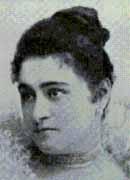
The soprano who created the role of Maddalena in Andrea Chenier was Avelina Carrera. Born in Barcelona on 2 January 1871, her original surname was Carreras. She made her debut at the Liceu in Barcelona in 1889 in Lohengrin when she was just 18. She had an immediate success, so much so that afterwards she was signed up by the major theatres in her own country and abroad. Her other successes were in
Otello, Tannhauser, Die Walkure, Aida, Faust, and more or less all the dramatic repertory of the era. She sang until 1910, and then dedicated herself to teaching singing in the city of her birth.
Otello, Tannhauser, Die Walkure, Aida, Faust, and more or less all the dramatic repertory of the era. She sang until 1910, and then dedicated herself to teaching singing in the city of her birth.
AVELINA CARRERA
Created the role of Maddalena in 1896
THE 'IMPROVVISO'
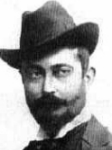
LUIGI ILLICA
Wrote the libretto of Andrea Chenier
The 'Improvviso' ('Un di all'azzurro spazio')
Andrea Chénier's aria from Act I of Andrea Chénier
English translation: Randall Garrou of aria-database.com
Colpito qui m'avete
ov'io geloso
celo il più puro palpitar dell'anima.
Or vedrete, fanciulla, qual poema
è la parola "Amor,"
qui causa di schermo!
Un di all'azzurro spazio
guardai profondo,
e ai prati col mi di viole,
piove va l'oro il sole,
e folgorava d'oro il mondo;
parea la Terra un immane tesor
e a lei serviva di scrigno, il firmamento.
Su dalla terra a la mia fronte
veniva una ca'rezza viva, un bacio.
Gridai, vinto d'amor:
T'amo, tù che mi baci,
divinamente bella,
o patria mia!
E volli pien d'amore pregar!
Varcai d'una chiesa la soglia;
là un prete nelle nicchie dei santi
e de la Vergine, accumulava doni...
e al sordo orecchio
un tremulo vegliardo invano
chiedeva pane,
e invan stenddea la mano!
Varcai degli abituri l'uscio;
un uom vi calunniava bestemmiando
il suolo
che l'erario a pena sazia
e contro a Dio scagliava,
e contro a li uomini
le lagrime dei figli.
In cotanta miseria la patrizia prole,
che fa?
Sol l'occhio vostro
esprime umanamente qui,
un guardo di pietà,
ond' io guardato ho a voi sì
come a un angelo.
E dissi:
Ecco la bellezza della vita!
Ma, poi, alle vostre parole,
un novello dolor,
m'ha còlto in pieno petto...
O giovinetta bella,
d'un poeta non disprezzate il detto:
Udite!
Non conoscete amor,
amor, divino dono, no lo schernir,
del mondo anima e vita è l'Amor!
You have struck me here
where I, jealous,
conceal the most pure beating of my soul
Now you will see, young lady, what a poem
is the word "Love,"
here a reason for ridicule!
One day to the blue spaces
I looked profoundly,
and to the fields filled with violets,
rained the gold of the sun,
and illuminated of gold the earth,
it seemed the Earth an immense treasure,
and to her the skies served as a coffin.
Up from the earth to my face
came a lively carress, a kiss.
I shouted, overcome by love.
I love you who kiss me
divinely beautiful,
my homeland!
And I wanted, with great love, to pray!
I passed through a door at a church;
There a priest, in the alcove of the saints
and of the Virgin, he was gathering gifts...
and to the deaf ear,
an old man, trembling, in vain
was asking for bread,
and in vain extended his hand
I went into a workman's hut;
a man there was offending, swearing at
the earth
that the treasury barely fills
and against God he was swearing,
and against men
the tears of his children.
In so much misery the patrician line,
what do they do?
Only your eye
expresses humanely here,
a look of pity,
where I looked at you,
you like an angel.
And I said;
Here the beauty of life!
But, then, to your words
a new sadness
has gripped my heart...
Oh beautiful young lady,
don't discredit the words of a poet
Listen!
You don't know love.
love, a divine gift, don't scoff at it,
the life and soul of the world is love!
COMPARE TENORS SINGING THE 'IMPROVVISO'
José Carreras 1979
Plácido Domingo 1981
Franco Corelli date unknown
Aureliano Pertile 1925
Enrico Caruso 1907
CARRERAS IN ANDREA CHENIER
"Switching effortlessly from the lyric poet Rodolfo in La Boheme a few weeks ago to the heroic poet Chenier, the Spanish tenor's vocal artistry held us spellbound throughout"
'Andrea Chenier: Royal Opera House', Daily Telegraph 1984
"Carreras sang the role with greatest distinction [...] Chenier is a hero as well as a poet and Carreras provides heroic notes, which comes as no surpise to those who followed his career closely over the past year [...] He set alight the opening act, which at times only smoulders, with a ringing timbre and notes hit plumb centre. He is the most honest of tenors: he fudges nothing. And as his recent Rodolfos proved, the lyricism remains for Chenier's final aria 'Come un bel di di Maggio' which, like the first act 'Improvviso', the librettist based on the verses of the real Chenier."
'Andrea Chenier, Royal Opera House', The Times, 1984
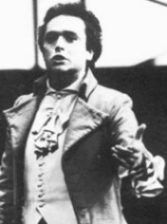
"The singing is interesting as well. Tenor, José Carreras, while hardly having an easy time with this extremely heavy part, sings as impassioned a poet as one could ask for-his involvement in the text and the action very special indeed."
Robert Levine, 'Video Review: Andrea Chenier, Teatro alla Scala', Ovation Magazine 1987
"Carreras' concentration and dramatic accent, plus an ability to insinuate himself into a role, insured that though he did not provide the vocal essence of Chénier, he did create the synthesis necessary to convey that scion of liberty caught in the vortex of his own destiny and an epic cause."
Carl Battaglia, 'Opera Review: Andrea Chénier, Verona 4 July 1986', Opera News, 1987
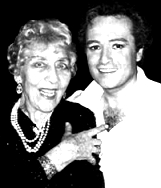
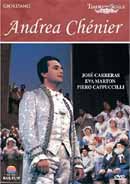

Jose Carreras with Sara Giordano, the composer's widow, on the opening night of the 1982 Andrea Chenier at La Scala, Milan
Audio CD, Studio 1987
Carreras, Marton, Zancanaro
Conductor: Patane
Sony Classics
DVD Live Performance,
La Scala Milan, 1985
Carreras, Marton, Cappuccilli
Kultur/NVC Arts
SOURCES AND FURTHER INFORMATION
With José Carreras in the title role
Including Barcelona 1979, La Scala 1982, London 1984, La Scala 1984, and Verona 1986.
Enciclopedia della musica, Ricordi & C. Editori, 1963 BACK TO TOP
This page was last updated on: October 30, 2006